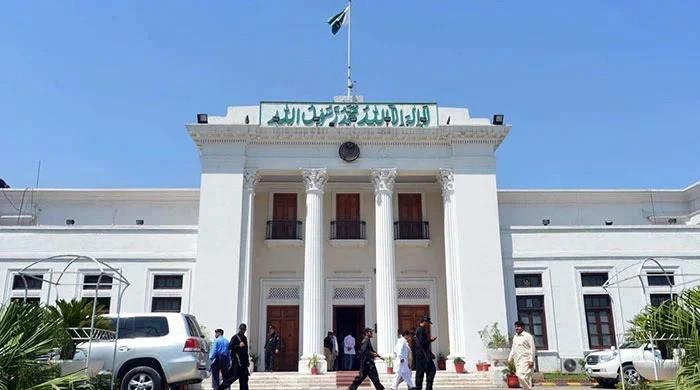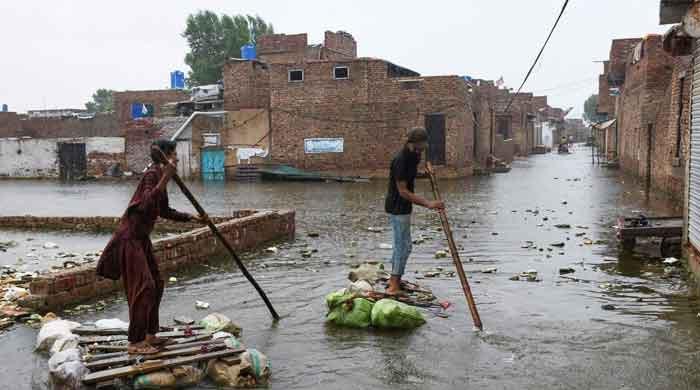Silent screams
A 2022 study by ILO says one in every four households in Pakistan employs a child in domestic work
November 20, 2023

Face bruised, eyes swollen, skull cracked, bones broken, burnt skin. The heartbreaking and gut-wrenching state of 14-year-old Rizwana a day after she was admitted to a hospital in Lahore.
This was her state a day after she was very conveniently dropped off outside her home after being brutally tortured and abused, allegedly by her employer, the wife of a civil judge. Rizwana’s tragic case propels us into a battle against this heinous practice.
Rizwana, one of 10 children, was coerced into employment in Islamabad, highlighting the dire circumstances that force families into such decisions. Her mother told a child rights activist that she had only spoken to Rizwana once during her employment tenure, and she did not recall the exact length of employment, "six months or maybe a year".
“If we had fewer children, two or three, we might not have been forced to send our young daughter to work”, she added.
As chairperson of the National Commission on Child Rights (NCRC), I am compelled to address this issue and advocate for stricter laws and better enforcement to ensure justice for victims like Rizwana so that culprits are not able to escape the law, get bail or reach a settlement.
The mandate of the NCRC is to examine and review policies, laws, practices, and proposals, inquire into violations of child rights, conduct research, raise awareness, build capacities, synergise, provide technical support, and advise the government on legislative and policy matters by virtue of Section 15 of the National Commission on the Rights of Child Act of 2017.
There are several laws prohibiting child labour. The issue of child domestic labour is specifically covered in the Punjab Domestic Workers Act 2019 and the Islamabad Capital Territory Domestic Workers Act 2022, which prohibit children under the age of 15 & 16, respectively, from working in any capacity in a household. Other laws related to child labour include Employment of Children Act 1991 in ICT, Punjab Restriction on Employment of Children Act 2016, Domestic Workers Act 2022, and Punjab Prohibition of Child Labor at Brick Kilns Act 2016 in Punjab, Khyber Pakhtunkhwa Prohibition of Employment of Children Act 2015 and KP Home Based Workers (Welfare and Protection Act 2021) for KPK, Sindh Prohibition of Employment of Children Act 2017 in Sindh & Balochistan Employment of Children (Prohibition and Regulation) Act 2021 in Sindh.
The latest Labour Force Survey 2020–21 reveals that 8.23% of children between 10 and 14 years are engaged in work (9.82% of boys and 6.4% of girls). Provincial data reveals that Punjab has the highest proportion of children between the ages of 10 and 14 years engaged in child labour (10.32%), followed by Sindh (7.16%), Khyber Pakhtunkhwa (4.57%) and Balochistan (4.33%).
While there is no database to register the number of child domestic labourers or recent figures specifically related to child domestic labour, according to a 2022 qualitative study by the International Labor Organization (ILO), one in every four households in Pakistan employs a child in domestic work, predominantly girls, aged 10 to 14 years.
While several laws exist to curb child labour, there is a critical need for a comprehensive law specifically criminalising child domestic labour. The NCRC’s proposed amendment to the Pakistan Penal Code (PPC) aims to make child domestic labour a non-bailable and non-compoundable offence, holding employers and caregivers accountable. Although deferred due to observations by the law minister, the NCRC remains committed to refining this draft through stakeholder consultations.
Meanwhile, prominent civil society activists and provincial child protection authorities also joined the call for prohibiting child domestic labour. Nadia Jamil, a prominent voice for child rights, rightly points out that blaming poverty is not an excuse for subjecting children to labour. We must unite – all citizens including parents, teachers, religious scholars, politicians, governments, and civil society activists — to advocate for a child labour-free Pakistan.
Legislation alone cannot uproot this harmful practice deeply rooted in patriarchal customs. Families argue they provide better for these children, justifying their exploitation. However, my response is simple – if you care for these children, sponsor their education, food, and clothing without separating them from their families and without abusing them; employ adults and pay them at least the minimum wage. Article 25-A of our constitution and the United Nations Convention on the Rights of Child (UNCRC) underline every child’s right to education; we must ensure no child is left behind.
To combat this issue effectively, we need not only the implementation of existing laws but also a Social Behavior Change Communication (SBCC). Communities must alter attitudes towards child labour, recognising it as an affront to the rights of our most vulnerable.
As we commemorate Universal Children’s Day, I implore every household to envision a child labour-free Pakistan. Let us collectively ensure that every child experiences the childhood he/she truly deserves, free from the shackles of exploitation. The NCRC will persist in its mission, and we urge all to join us in this crucial endeavour for a brighter and more just future.
The writer is the chairperson, the National Commission on the Rights of the Child (NCRC). She tweets @ayesharaza13
Disclaimer: The viewpoints expressed in this piece are the writer's own and don't necessarily reflect Geo.tv's editorial policy.
Originally published in The News











